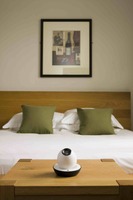How to sleep easy when the clocks change

Many of us will be looking forward to an extra hour in bed this weekend as the clocks go back but for those struggling to sleep, the change in routine can add to the daily battle of getting enough shut eye.
A lack of sleep can lead to serious medical conditions including obesity, heart disease and diabetes and with the NHS handing out over 10 million prescriptions in England for sleeping pills every year, the thought of the clocks changing can cause worry for those who find it difficult to get a restful night.
Shaun Cobb is general manager at LightSleeper, which is a small device that projects a soothing light on the ceiling. The light moves in a circular motion above the bed, and if those struggling to snooze follow the light with their eyes for a few minutes, they will begin to drift off.
Shaun knows the problems people have with any change in bedtime routine and he said: “As the clocks fall back an hour, people’s sleeping patterns can be unwittingly altered. It may only be a small change time wise but the disruption of darker evenings and lighter mornings can impact heavily on those who struggle with sleep.
“With that in mind, we have put together a list of things that can help improve your ability to get to sleep, stay asleep and awake feeling refreshed and revitalised.”
Maintain a regular bedtime routine. The body clock is regulated by the brain, and the brain does its work best when it follows the same pattern of sleeping and waking every day. It is important to maintain your sleep/wake pattern, even at weekends, when there may be a temptation to go to bed later, or to stay in bed later.
Relax before bed. Relaxing sends a signal to the brain that it’s time to wind down so have a warm bath or listen to soft music and avoid bright light or activities that cause stress and anxiety.
Finish eating at least 2-3 hours before your bedtime. Avoid spicy foods that may cause heartburn and discomfort during the night. However, a light snack may help promote sleep. Bananas contain an amino acid called tryptophan, which is thought to convert into a calming and sleep-inducing chemical in the brain.
Take regular exercise – but do it early. Exercising regularly makes it easier to fall asleep, and helps you sleep better. However, the best time to exercise is in the morning, or early afternoon; exercising just before bedtime will make falling asleep more difficult. During exercise the body temperature rises and can take up to six hours to fall again. Elevated body temperature can impede sleep.
Avoid alcohol. Although alcohol can initially make you sleepy, it reduces the quality of your sleep, and you’ll find yourself waking later in the night. To avoid this, stay away from alcohol in the last few hours before bed.
Avoid caffeine. Caffeine is a stimulant and remains in the body for 3-5 hours making it difficult to get to sleep.
Avoid nicotine. Nicotine too is a stimulant and, as a result, disrupts sleep. Additionally, heavy smokers actually experience nicotine withdrawal as the night progresses, making it hard to stay asleep.
Make your bedroom a place of comfort and relaxation. A cool, dark, quiet room is best. If your room is too light, try a blackout blind. If it’s too noisy, try using earplugs.
Only use the bedroom for sleep. Don’t work, make phone calls, or eat in bed so you can strengthen the association between the bedroom and sleep. Don’t watch the television, as it is stimulating. Even if the programme you are watching doesn’t capture your interest, advertisements are specifically designed to grab your attention.
Try a natural sleeping aid. Staff at your local health shop will be able to advise you on which products can help you get some shuteye or why not try lavender essential oil. Research show lavender may lengthen sleep time, increase deep sleep, and help people feel refreshed in the morning. I am biased, but our LightSleeper device really helps relax the mind by following the soothing light projected onto the ceiling. LightSleeper won’t disturb others in the room and switches itself off after 30 minutes so not only is it energy efficient, but users won’t have to worry about turning it off, helping gain a natural sleep rhythm back.
For more information on how to get a good night’s sleep and our LightSleeper device visit lightsleeper.co.uk go to LightSleeper on Facebook or follow on Twitter @Light__Sleeper.

